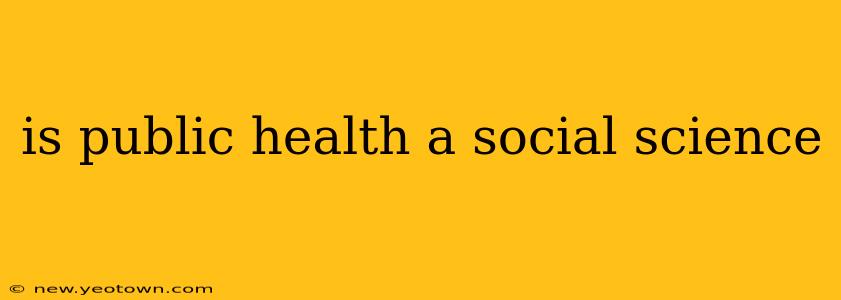Is Public Health a Social Science? Unraveling the Intertwined Threads
The question of whether public health is a social science is not a simple yes or no. It's more accurate to say that public health is a multidisciplinary field that draws heavily upon social sciences, alongside natural sciences and other disciplines. Think of it like a richly woven tapestry—social sciences are a significant thread, but far from the only one.
My journey into understanding this complex relationship began with a simple question: how do we improve the health of entire populations? It quickly became clear that addressing this challenge requires more than just medical knowledge. It demands a deep understanding of human behavior, societal structures, and the intricate interplay between individuals and their environments. This is where the social sciences step in.
What are the Social Sciences Involved in Public Health?
Let's explore some key social science disciplines that are fundamental to public health:
-
Sociology: Sociology provides crucial insights into how social structures, inequalities, and cultural norms influence health outcomes. For example, understanding the social determinants of health – factors like poverty, education, and access to resources – is vital for developing effective public health interventions. A sociological lens helps us see how societal factors contribute to disparities in health across different populations.
-
Psychology: Understanding individual behaviors and mental health is essential in public health. Psychology helps us design effective health promotion campaigns, understand the psychological barriers to adopting healthy lifestyles, and develop interventions to address mental health issues within communities. For instance, understanding the psychology of addiction is crucial for developing effective substance abuse prevention programs.
-
Anthropology: Anthropologists bring a unique perspective to public health by examining the cultural context of health and illness. They help us understand how cultural beliefs and practices impact health behaviors and the effectiveness of interventions. For instance, studying cultural beliefs about disease can help tailor public health messages to be more effective within specific communities.
-
Economics: Economic principles are critical in public health resource allocation, cost-effectiveness analysis of interventions, and understanding the economic impact of disease. For example, analyzing the economic burden of chronic diseases helps to prioritize public health spending and resource allocation.
-
Political Science: Political science plays a vital role in shaping health policy, advocating for health equity, and navigating the complexities of the political landscape to implement effective public health programs. Understanding policy-making processes is crucial for successful public health initiatives.
How Social Sciences Contribute to Public Health Practice:
The contribution of social sciences isn't just theoretical; it's directly applied in various aspects of public health practice:
-
Developing effective health promotion campaigns: Understanding social norms and psychological factors helps design campaigns that resonate with target populations and motivate behavior change.
-
Designing health interventions tailored to specific communities: Cultural sensitivity and awareness of social determinants are crucial for ensuring interventions are appropriate and effective.
-
Evaluating the impact of health programs: Social science methods are used to assess the effectiveness of programs and identify areas for improvement.
-
Addressing health disparities: Understanding the social factors that contribute to health inequalities is essential for developing strategies to reduce disparities.
-
Informing health policy: Social science research provides evidence to inform the development and implementation of effective health policies.
Is Public Health Just a Social Science?
While social sciences are undeniably crucial, public health is not solely a social science. It also relies heavily on:
- Epidemiology: The study of disease patterns and their causes.
- Biostatistics: Applying statistical methods to analyze health data.
- Environmental health: Understanding the impact of the environment on health.
- Health services research: Examining how healthcare systems function and can be improved.
In conclusion, public health is a multifaceted field that integrates knowledge and methodologies from various disciplines, including the crucial contributions of social sciences. It is through this collaborative, interdisciplinary approach that we can most effectively tackle the complex challenges of improving population health. Public health isn't just a social science, but it's undeniably a social science, and a profoundly important one at that.

